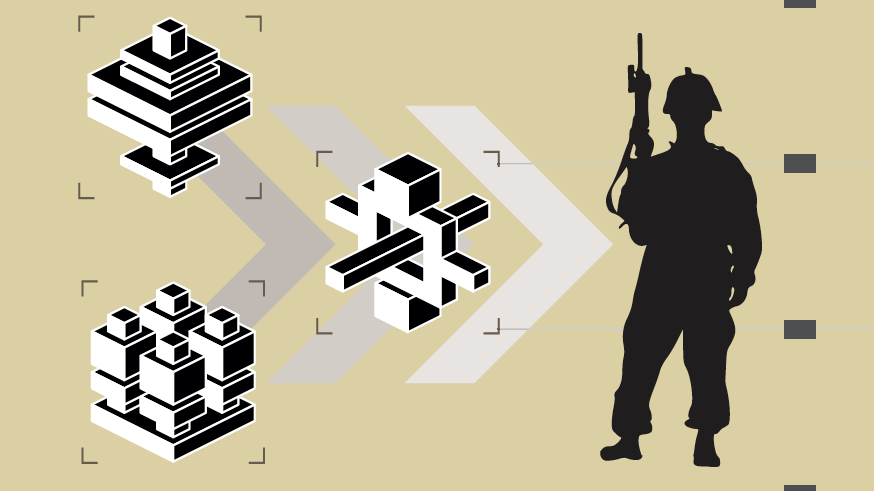
At the recent ITEC 2016 event held in London, Nick Coppings, President of MBDi, asked businesses to question if they are putting solutions in front of customer requirements. MOD DCB features writer Paul Elliott was there to hear what makes a good business development professional in defence.
Good business should be about understanding customer requirements before selling solutions. Sounds simple, doesn’t it? You don’t have to dig too deep, however, to find businesses happy to sell their products and services regardless of whether they are suitable for the customer or not: a sale is a sale, after all. Yet, whether it’s winning contracts or launching new products, understanding customer requirements is essential. About one in three start-up companies fail because there is no need for their product in the marketplace. It is a classic example of putting the solutions cart in front of the requirements horse, and it happens across the supply chain.

Nick Coppings is a man who knows a lot about requirements and solutions. He reckons if you tend to put solutions in front of requirements then more often than not you’re going to get yourself in trouble. He says it all hinges on the thinking process adopted by individuals, and on company culture. Essentially, good business development is about people, according to Mr Coppings. He believes people in business development, or sales, often don’t understand the methodology of the role. So they fall back on the only thing they know at that point, which is technical knowledge; they think their job is to educate people on products and services.
This, Mr Coppings argues, is where things start to go wrong. He explained: “Being in an industry such as this with a lot of constructional designers, engineers and solutions architects, I find the need to talk about requirements before solutions interesting because all the designers and solutions architects and so forth that I’ve worked with won’t do anything unless the requirements are well documented. So why is it so different when it comes to business development?
“When you start putting solutions before requirements, you just think the job is to go out and make a sale. If you’re an organisation that’s quarterly-driven it becomes even more important. You get told not to worry about stuff that’s over the horizon – just the next order.”
Mr Coppings continued: “So what happens when we don’t learn the correct thinking? We develop bad habits, we go out and do it the way we think we’ve got to do it. The worst thing that happens is when we’re actually successful on occasion and so learn to do it all wrong. Part of what we have to do then is go back and unlearn the things we’ve learned incorrectly.
“A really intelligent man once said to me: ‘If you want to be good at something go out and find somebody that does it well, and learn how they think.’ So don’t worry about what they do, learn how they think.”
The culture of a business is vitally important too. If you are in a culture that tends to value sales more than anything you’ll find it very difficult to go out and work from a requirements-led position. This will require a change of thinking. To paraphrase Albert Einstein, ‘The thinking that got us to where we are isn’t going to get us to where we need to go.’
It is accepted these days that companies should adopt an enterprise approach to business development, or sales, which is more collaborative with customers and other parties. Mr Coppings says businesses looking to take forward an enterprise approach should establish what kind of thinking will make that model successful. Businesses need to establish if their thinking is going to move them forward or anchor them in the past.
There is a difference between a sales person and a partner collaborator. The role of a sales person tends to have a lot of negative connotations attached to it – hang on to your wallet. Mr Coppings advises you need to learn not to think like a sales person. He says you don’t provide value as a sales person – a sale is merely a transaction. Value is provided in exploring, in collaborating, and in partnering.
Mr Coppings says you’ve got to understand the problem the customer wishes to solve because if you don’t there is no way you can ever provide a solution. He says sales people tend to be goal-focused; it’s all about them making the sale and getting their needs met. Collaborators and partners, factoring in the enterprise approach, are more focused on working together. It’s more about a shared problem with shared accountability. It’s about having empathy with other people’s business problems and taking the time to learn and understand them.
He explained: “Professionals in business development spend a lot of time seeing the world from other people’s perspectives. One of the key factors that we look at when assessing professionals in business development is evaluating their self-orientation. Are they purpose-driven where it’s more about the customer; or are they goal-driven, where it’s more about them? If you’re totally purpose-driven you’re more in social work than anything else, but if you’re totally goal-driven it’s all about you. So keeping that balance right is very important.
“Would you buy from you? That’s a question you should ask yourself. How do you see yourself? If you were to make a call on yourself to understand requirements would you want to deal with you? If you say no, then why would you expect other people to work with you?”

“Co-creating value means working as a team. If you are truly purpose-driven and understand the problem you can help the customer find their solution, whether or not they buy it from you – if you benefit from it that’s great. That’s how you develop trust; you help people solve problems without forcing them to buy your solution” – Nick Coppings, President, MBDi
Mr Coppings says you should engage early and collaborate often. If you engage early it’s fairly easy to change requirements with the customer. If you start early and collaborate then the value you bring to a project is huge, but if you start late the value you can bring once the requirements have been defined is very limited. So good practice would be to know where you provide value and then collaborate to do it.
Giving briefings is a systemic problem in the defence industry, according to Mr Coppings. People like to deliver PowerPoint presentations and talk about their solutions and capabilities, spending a lot of time talking about themselves rather than taking the time to ask questions of the customer. This takes it back to understanding the requirement and collaboration. For Mr Coppings, business development proper is rarely about giving briefings. He says business development people get paid to go out and gather intelligence, and if they’re giving briefings they’re missing a lot of the input they could be gathering.
Mr Coppings commented: “People don’t know what they don’t know. I think that’s one of the benefits of the enterprise approach, or consortium approach, where you can get academia, big business and small business in a room and say ‘Give us the best of what’s out there; help us understand what else is out there.’ In order to do that you’ve got to take the time to truly understand the problem. Sharing intelligence takes more than just asking questions; it takes trust.
“I see this as co-creating value. If you’re goal-driven and you’re in it for yourself it can be seen as manipulation – you shaping the customer’s requirements to benefit your organisation. Co-creating value has a different connotation – it means working as a team to co-develop that value. If you are truly purpose-driven and understand the problem you can help the customer find their solution, whether or not they buy it from you. That’s what you should do – that’s co-creating value, and if you benefit from it that’s great. That’s how you develop trust; you help people solve problems without forcing them to buy your solution.”
Listening to Mr Coppings, it appears the real differentiator for successful business development lies with business development professionals themselves. They need to develop the ability to ask questions, to be empathetic, and to focus on the customer. They need to take their time and ask a lot of questions, to listen and understand the problem. The important lesson is not to sell at any cost if you want customers to trust you, and to work with you.
If you would like to read more articles like this then please click here
Business ITEC ITEC 2016 Nick Coppings Procurement & contracts SME








